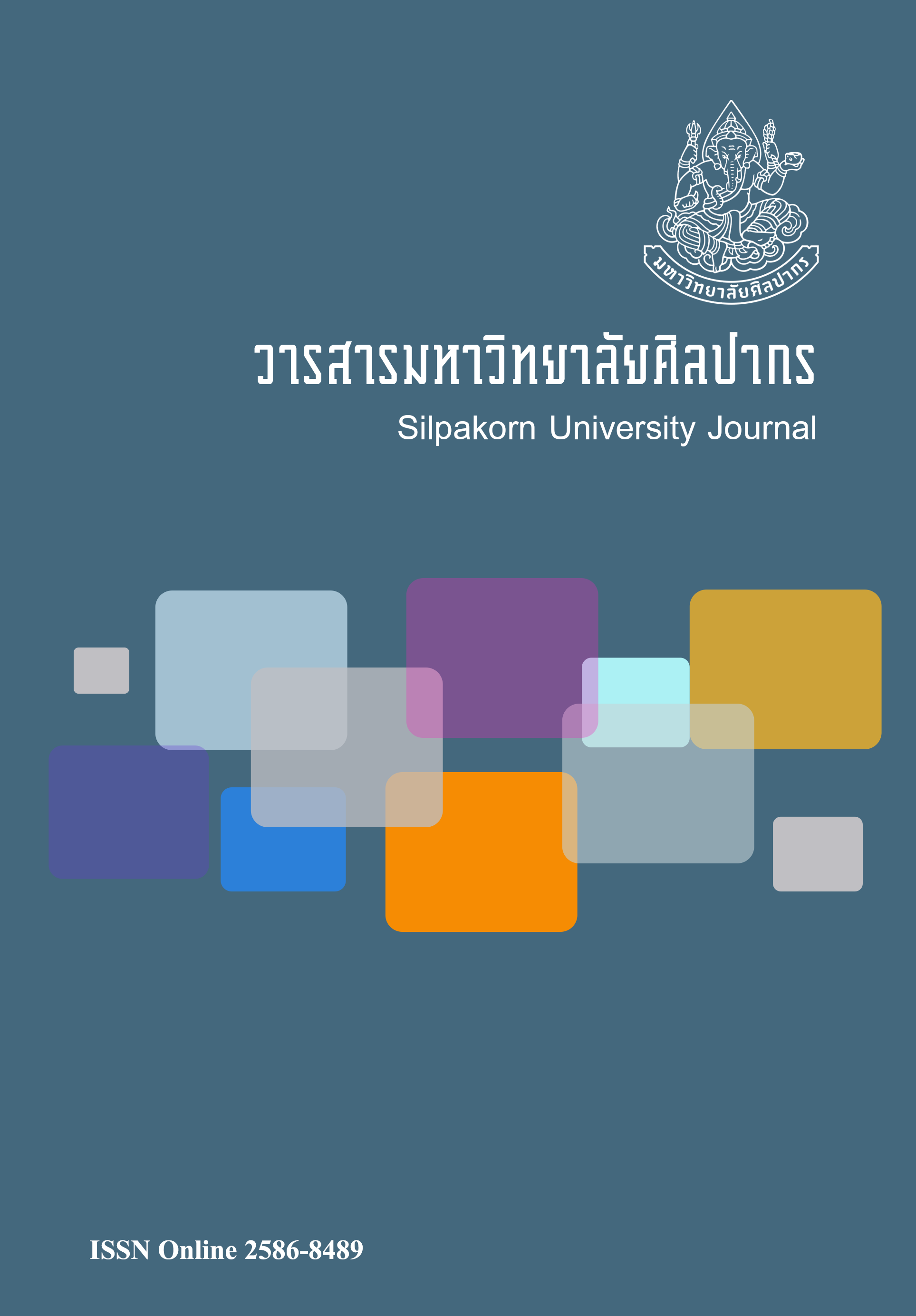การดำเนินนโยบายสิทธิมนุษยชนด้านสิทธิและเสรีภาพในชีวิตและร่างกาย: กรณีศึกษาชาวโรฮิงญาจังหวัดสงขลาและระนอง (Implementation of human rights policy regarding rights to and liberty of life and body: a case study of Rohingya in Songkhla and Ranong in Thailand)
Main Article Content
Abstract
การวิจัยนี้ได้ทำศึกษาถึงการดำเนินการตามนโยบายของรัฐบาลไทยและเข้าใจถึงปัญหาของการนำนโยบายไปปฏิบัติในการแก้ไขปัญหาชาวโรฮิงญาเรื่องสิทธิมนุษยชนด้านสิทธิและเสรีภาพในชีวิตและร่างกาย ตามปฏิญญาสากลว่าด้วยสิทธิมนุษยชนแห่งสหประชาชาติ โดยใช้ตัวแบบสหองค์การ (Intergovernmental Policy Implementation Model) ของ Donald Van Meter และ Carl Van Horn เป็นกรอบแนวคิดในการวิจัย ซึ่งเป็นการวิจัยเชิงคุณภาพ ที่ทำวิเคราะห์ข้อมูลจากเอกสาร การสัมภาษณ์เชิงลึก และการประชุมกลุ่มย่อย โดยปัจจัยที่ส่งผลกระทบต่อการนำนโยบายนี้ไปปฏิบัติ ได้แก่ 1) ทรัพยากรนโยบาย ภาครัฐขาดแคลนเงินงบประมาณและบุคลากร ซึ่งการจัดสรรงบประมาณเป็นไปอย่างล่าช้าไม่สอดคล้องกับห้วงเวลา และกระจัดกระจายตามหน่วยงานต่างๆ 2) มาตรฐานนโยบาย เจ้าหน้าที่รัฐทุกคนมีความเข้าใจในวัตถุประสงค์และเป้าหมายของนโยบายตรงกัน แต่ไม่อาจแก้ปัญหาในทุกมิติให้หมดไปได้ ภายใต้ขอบเขตที่จำกัดของเจ้าหน้าที่รัฐในการตัดสินใจแก้ไขปัญหา 3) การสื่อสาร การประชาสัมพันธ์การปฏิบัติงานของเจ้าหน้าที่รัฐส่งผลกระทบต่อการปฏิบัติงานและความน่าเชื่อถือของประเทศ ขณะเดียวกันการประสานงานระหว่างองค์การก็ไม่มีประสิทธิภาพเท่าที่ควร 4) การบังคับใช้กฎหมาย กฎหมายบางฉบับไม่มีการปรับปรุงให้เท่าทันกับยุคปัจจุบัน ทำให้การปฏิบัติงานของเจ้าหน้าที่รัฐขาดตกบกพร่อง ตลอดจนกฎหมายแต่ละฉบับไม่อาจนำมาใช้ได้ทั้งกระบวนการ จึงอาจต้องอาศัยกฎหมายอื่นมาร่วมพิจารณา 5) คุณลักษณะขององค์การที่นำนโยบายไปปฏิบัติ การเจรจาและปฏิบัติงานร่วมกับนานาชาติมีแนวโน้มและทิศทางที่ดีขึ้น ขณะที่การดำเนินงานของภาครัฐเป็นไปตามลำดับขั้นตอนด้วยการควบคุมดูแลโดยหน่วยงานด้านสิทธิมนุษยชน 6) เงื่อนไขทางสังคม เศรษฐกิจ และการเมือง พบว่า วิถีชีวิตความเป็นอยู่ที่ยากจนภายใต้แรงกดดันจากกระแสต่อต้านชาวเมียนมาและความนิ่งเฉยของรัฐบาลเมียนมาต่อการแก้ปัญหาความขัดแย้งระหว่างเชื้อชาตินี้ ขณะที่มาเลเซียกำลังต้องการพัฒนาเศรษฐกิจ ทำให้ชาวโรฮิงญาพยายามหลบหนีออกนอกประเทศ 7) ทัศนคติของผู้ปฏิบัติงาน พบว่า เจ้าหน้าที่รัฐส่วนกลางด้านความมั่นคงและด้านสังคมมีความคิดเห็นแตกต่างกันในการแก้ไขปัญหาอย่างยั่งยืน เจ้าหน้าที่ในพื้นที่ล้วนมีทัศนคติที่สอดคล้องกันในการแต่งตั้งคณะกรรมการพิเศษขึ้นมาจัดการกับปัญหานี้ แต่เจ้าหน้าที่รัฐส่วนกลางและในพื้นที่ต่างมีทัศนคติที่ขัดแย้งกัน เนื่องจากข้อจำกัดด้านทรัพยากร นอกจากนี้ ปัจจัยอื่นๆ ที่ส่งผลกระทบต่อการนำนโยบายนี้ไปปฏิบัติในพื้นที่จังหวัดสงขลาและระนอง ได้แก่ 1) ทำเลที่ตั้งและสภาพภูมิประเทศ 2) โครงข่ายการคมนาคมที่เชื่อมโยงระหว่างกัน และ 3) ความก้าวหน้าทางเทคโนโลยี
The purposes of this research to study and understand the problems associated with implementing right to life and liberty human rights policy in combating discrimination of the Rohingya by using the United Nations Universal Declaration of Human Rights as a research quality tool in analyzing information received from documents, in-depth interviews, and qualitative group discussions. The models of Donald Van Meter and Carl Van Horn are used to analyze problems in the policy implementation. Factors that affect policy implementation include: 1) Resource policy that a lack of human resources and budget. The biggest problems are delays in the budget allocation and the budget not matching the appropriate timeframe. The budget is dispersed among multiple agencies. 2) Policy standards show that officials understand the objectives and goals of the policy, but are not able to fully rectify issues concerning the Rohingya within the scope of decision making power provided. 3) Communications, such as the public relations aspect of work performed by officials, affects the image and credibility of the country. Public relations between organizations are not as effective as it should be. 4) Law enforcement shows that the law has not evolved as current situation, so certain government officials neglect their duties. Existing law is also not sufficient. There is no single law that is appropriate to be cited throughout the entire chain, which means that multiple laws must be brought into play in enforcement. 5) Attributes of contributing organizations that are relevant to the problem and cooperation between the two, especially ASEAN, has been improving. The government enactment of policy must adhere to the established guidelines, with oversight and review from human rights organizations. 6) Social, economic, and political conditions have found that opposition by the Burmese, who coupled with apathy on behalf of the Myanmar Government towards civil strife, and the Malaysian economic growth has developed to the high income country. All are the driving factor leading the Rohingya to flee from the country, and 7) Attitudes of officials have found that central authorities from security and social departments cannot agree on a long term solution to the problem. All involved tend to agree in the formation of a board to specifically combat the issue, but central and local authorities share differing attitudes on how the law should be enforced, aside from the agreement on having insufficient resources. Finally, other factors that affect the implementation of policy in Songkhla and Ranong provinces include: 1) Terrain and location of Thailand, 2) the communications network that links the three countries, and 3) technological advancement, which are other potential obstacles that cannot be ignored.
Article Details
References
Kipgen, N. (2013). Addressing the Rohingya problem. Journal of Asian and African Studies, 49(2). doi: 10.1177/0021909613505269
Mathieson, D. (2009). Perilous plight: Burma’s Rohingya take to the seas. New York: Human Rights Watch.
Ripley, R. B. & Franklin, G. A. (1990). Bureaucracy and policy implementation (6th ed.). Homewood, IL: Dorsey Press.
Sabatier, P. A. & Mazmanian, D. A. (1989). Implementation and public policy. Lanham, MD: University Press of America.
Simon, H. A. (1997). Administrative behavior (4th ed.). London, UK: Mac Millan.
Thianchainan, W. (2015, June 11). Chairman of U.S. committee for refugees and immigrants. Interview.
Ullah, A. A. (2011). Rohingya refugees to Bangladesh: historical exclusions and contemporary marginalization. Journal of Immigrant & Refugee Studies, 9(2), 139-161. doi: 10.1080/15562948.2011.567149
Walton, M. J. (2012). The “wages of Burman-ness”: ethnicity and Burman privilege in contemporary Myanmar. Journal of Contemporary Asia, 43(1), 1-27. doi: 10.1080/00472336.2012.730892
Yawapraphat, S. (2014). Public Policy (นโยบายสาธารณะ) (10th ed.). Bangkok: Chulalongkorn University Press.
Yenlaong, P. (2015, June 22). Head of Ranong Shelte for Child and Familiy. Interview.

